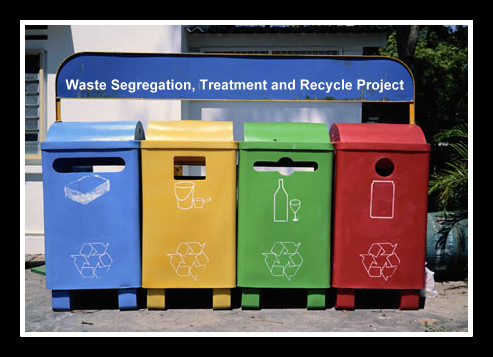Day in, day out we produce waste, be it from our food, the dishes that we clean, the dust and dirt and containers that we throw away. Believe it or not, our waste amount to mountains of garbage when accumulated. I've always wondered what happens to the my rubbish once it gets picked up by the dump truck. I mean, does it get dumped at a dump site? Does it get recycled? Does it get converted into other forms of energy?
 |
| Waste Segregation & Management Starts From Home |
Recently, after attending a talk on waste management, I did learn a thing or two on waste segregation and how it should begin from home. The basics are to sort out and segregate the wet and dry wastes into different bags and locations. Dry waste can be tagged for recycling, while wet waste should be send to be decomposed.
 |
| The good folks helping us to clear our garbage daily |
 |
| What are solid wastes? |
So what is wet waste and how is it different from dry wastes? Waste is waste, garbage is garbage, right? WRONG. Our wet wastes consist mostly of organic waste such as food, soiled diapers and other “damp” materials, while dry wastes consists of solid and recyclable materials which can be further separated into three groups: plastic, paper and other. Of course, not all dry wastes can be recycled, but that's another whole other topic in itself.
 |
| Segregate, Recycle, save our earth |
Coming back to the amount of waste we generate every single day. From what I've read from a fellow blogger's blog, there's this study in 2013 where Malaysia produced an average of 30,000 to 33,000 tonnes of waste each day. Where does it end up at? I really do hope efforts are put in place by the people in power to go about converting all these waste into useful energy. That way, it will actually be useful to us, instead of being thrown away to pollute the Earth.
 |
| Efforts are already in place to segregate the wastes from our homes |
While reading more into the topic of waste to energy, as I'm very much interested in how our waste can actually be converted into energy, electrical to be specific, for the usage of our countrymen. This brought me to the efforts done by Berlin, in Germany. They actually generate electricity for district heating from their garbage. How cool is that?
When the waste arrives at the the Berlin plant, it is inspected, weighed and trans ported to the waste incineration lines, where it is incinerated on the moving grates. The flue gases resulting from the combustion have a temperature of more than 850° C. High pressure super-heated steam is produced which is passed on to the neighbouring Reuter Power Station, where it is used to generate electricity and for district heating.
 |
| Reduce wastage, segregate it if possible, and do better waste management straight from the home |
So there you have it, a thing or two that I've learnt recently and would like to share here. Do watch out for my follow up post to this one, as I read up more on the Waste To Energy (WTE) efforts, it's impact and how it is being implemented. My subsequent post will be to share on this. As for now, remember to segregate, and manage your garbage, because we all love our Earth right?
Comments
Post a Comment